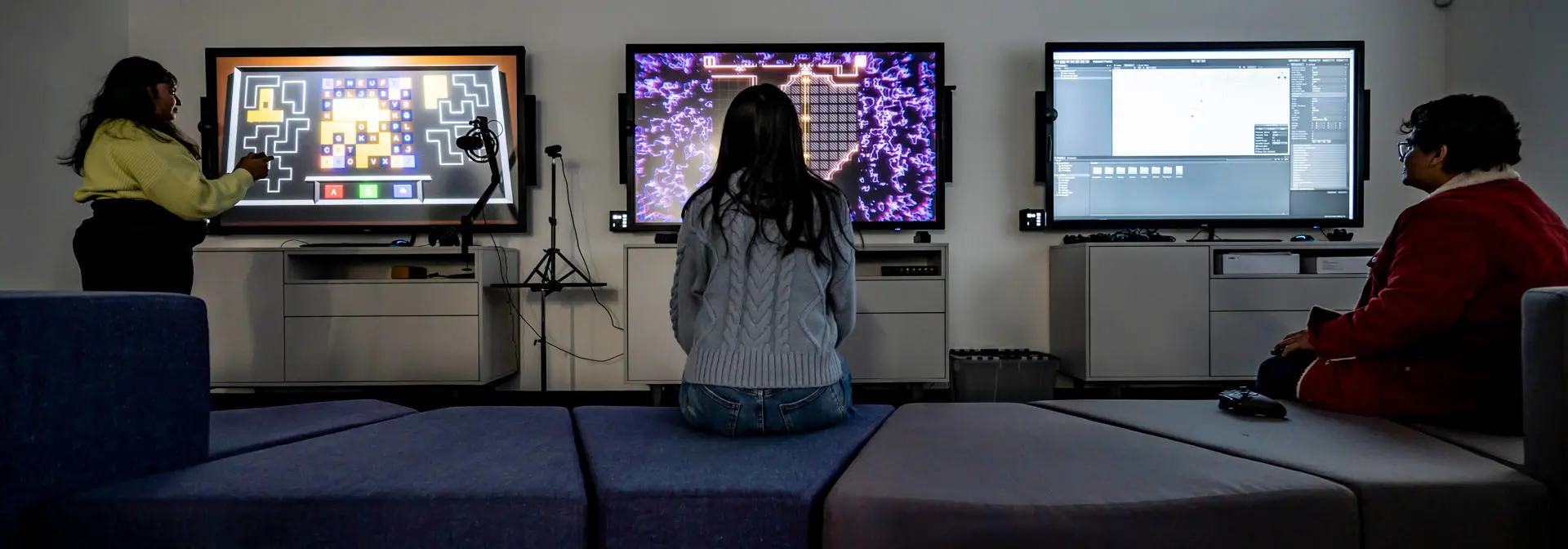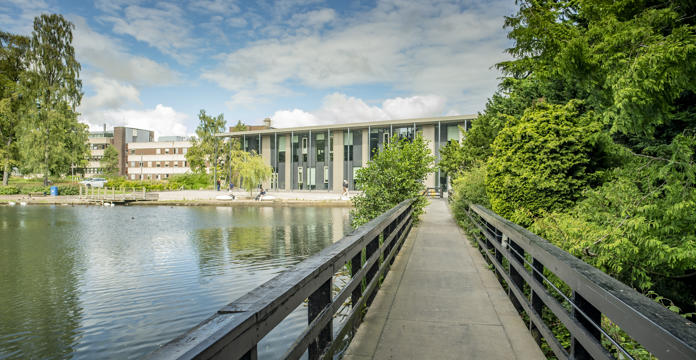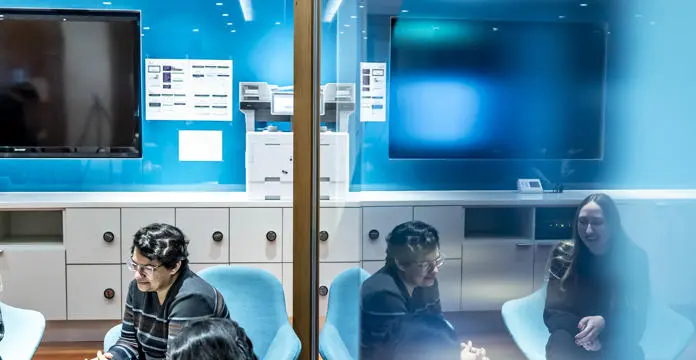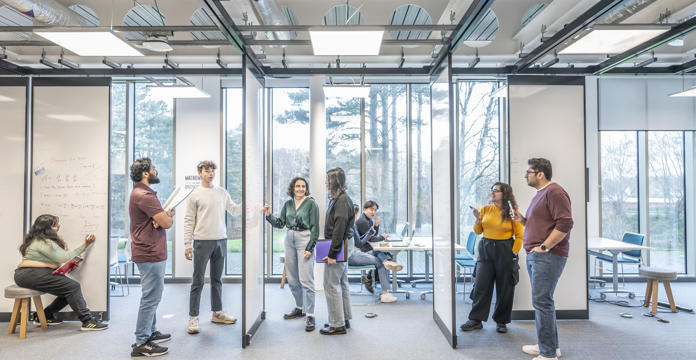Key information
- UCAS code
- Q2P3
- Level
- Undergraduate
- Delivery type
- Full Time
- Degree qualification
- BSc (Hons)
- Mode of delivery
- On-Campus
- Duration
- 5 years
- Location
- Edinburgh
- Start date
- September
If you want to start your career with a year's work experience in hand, then you should consider this course. It combines the rigorous studies of the BSc (Hons) Computer Science with a year of work placement in level 4. This means 12 months of experience working in an organisation in the computing sector by the time you finish your degree. The Diploma in Industrial Training is gained through successful completion of the work placement. The work placement helps you to develop specific work-related skills, giving you the opportunity to build upon the theory you've learned and have real-world experience. This course aims to give a well-integrated balance of theoretical underpinnings and practical experience, strongly informed by the research expertise of our academic staff.
Computer Science provides you with a comprehensive foundation to understand, design and implement cutting-edge computer software and systems. Our prestigious programme is intricately designed using insights from industrial partners and their industrial needs to give you the necessary modern skills in this fast-moving field.
Our Computer Science programme will introduce you to the core concepts and allow you to develop strong practical skills while nurturing your professional skills in problem-solving and project work. Our programme is aimed at empowering you to design systems, craft robust software and pioneer innovative technologies.
We launched Scotland’s first undergraduate degree in computing, as well as one of the firsts in the UK. We continue to lead and provide a well-established and outstanding education in Computer Science, including its core and most modern themes like Software Engineering, Artificial Intelligence, Data Science, Cyber Security, Cloud Technologies, Robust Systems, Parallel Systems and Robotics
Your student experience
-
Rankings: We are Ranked 6th in Scotland for Computer Science by The Complete University Guide 2023
-
Industry-Validated Curriculum: Our programme is meticulously crafted in consultation with leaders in the field of computer science. This ensures that you're equipped with the precise skills sought after by employers, giving you a competitive edge in the job market right from the beginning of your career.
-
Mastery of Essential Software Tools: In today's dynamic tech landscape, mastering fundamental software tools like Python, data analysis libraries, and programming frameworks is crucial. We've intensified our focus on these tools, ensuring you're well-versed and ready to thrive in practical computer science applications.
-
Integrated Course Structure: We've optimised our course structure to create a cohesive learning experience, emphasising the interconnectedness of various computer science disciplines. This integrated approach will empower you to solve intricate challenges and innovate across multiple domains within the field.
-
Access to Advanced Topics: Through our updated curriculum, you'll explore a range of advanced subjects, including machine learning, computational intelligence, and data mining. This expansion of your expertise will refine your skills and prepare you for tackling complex real-world computing projects.
Go Global
There are currently no Go Global opportunities for this particular programme. However, other Go Global opportunities may be available. Please contact studywithus@hw.ac.uk for more information.
Course content
September Intake - Edinburgh
You will cover programming, an introduction to computer systems, databases and discrete mathematics.
Mandatory September
- Logic and Proof
- Introduction to Interaction Design
- Praxis
- Software Development 1
Mandatory January
- Discrete Mathematics
- Introduction to Computer Systems
- Software Development 2
- Web Design and Databases
Programme Video

The Heriot-Watt experience
Fees and funding
| Status | Fee |
|---|---|
| Scotland | Paid by SAAS |
| England / Wales / N Ireland / Rep of Ireland | £9,250 |
| International | £24,048 |
- Status: Your residency status is usually defined as the country where you have been ordinarily resident for the three years before the start of your course.
- International: 'International' includes applicants from European Union countries who do not hold Pre-Settled or Settled status in UK. (This does not include students from the Republic of Ireland - see above).
Scholarships and bursaries
Bursaries for students from England, Northern Ireland or Wales
In addition to government loans and grants towards the costs of fees and living costs, we are offering generous financial support to attract and support eligible undergraduate students from England, Northern Ireland or Wales:
- Heriot-Watt University Bursary (up to £3,100 per year)
Additional information
Placement Year fees
Students with Scotland fee status pay £910 for the placement year instead of the standard fees. Students with England, Northern Ireland, Wales or Overseas fee status pay £1300 for the placement year instead of the standard fees.
Entry requirements
We have standard entry requirements for all of our courses that you will have to meet.
Standard entry requirements
- Highers ABBB (including Mathematics)
- A-Levels BBC – ABB (including Mathematics at B)
- Int. Baccalaureate 28 points (with Mathematics at Higher Level 5)
- BTEC DDM (including sufficient Mathematics)
- HNC B in graded unit (including sufficient Mathematics)
- Please check that you meet our University-wide National 5/GCSE (or equivalent) English and Maths requirements.
Minimum entry requirements*
- Highers BBBC (including Mathematics at B)
- A-Levels BCC (including Mathematics at B)
* Minimum: under our Fair Access Policy, we will relax our standard entry requirements for some Scottish students depending on their circumstances. Our minimum requirements will apply if you:
- live in an area within the Scottish Index of Multiple Deprivation lowest 20% (SIMD20), or
- are care experienced.
We can also make exceptions for some Scottish students with grades above minimum but below standard. Read more about our Minimum and standard entry requirements
Why Heriot-Watt
We're the top university in Scotland for graduate outcomes which means that more of our graduates are employed or in postgraduate education than any other institution in the country and we ranked 5th in the UK.
We're also rated number one in the UK for CEO or MD roles, meaning more of our graduates go on to become CEOs or MDs than any other university in the whole of the UK. On top of that, we have beautiful campuses, across the globe, so you'll get a truly international education. Our Edinburgh Campus is home to Oriam, Scotland's National Sports Performance Centre combined with plenty of wellbeing resources, prioritising fitness and mental health for all students. Our Global Research Institutes look at solving real world issues such as climate change and saving our oceans as well as working on the next medical technological breakthrough and the future of AI and robots.
Employability
Work and study
Salary
Potential career paths
- Information Technology professionals
Student life
Explore facilities, and chat to staff and students
Discover Uni course data
Discover Uni provides data on each university's degree courses across a range of measures including student satisfaction, graduate jobs and salaries.





